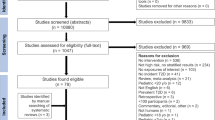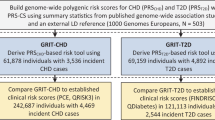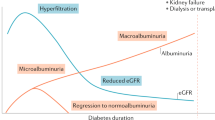Key Points
-
Over the past few years, more than 65 genetic loci associated with type 2 diabetes mellitus (T2DM) have been discovered that reveal novel biologic pathways
-
Clinical T2DM prediction models are improved by the addition of information about genetic risk variants
-
Genetic risk scores that aggregate risk variants can predict incident T2DM in populations of diverse ethnic background and age range
-
Lifestyle interventions targeting moderate weight loss lower the risk of T2DM, independent of the genetic burden, and might have increased benefit among individuals at high genetic risk
Abstract
Knowledge of the genetics of type 2 diabetes mellitus (T2DM) has evolved tremendously over the past few years. Following advances in technology and analytical approaches, collaborative case–control genome-wide association studies have revealed up to 65 loci credibly associated with T2DM. Prospective population studies have demonstrated that aggregated genetic risk scores, so-called because they sum the genetic risk attributed to each locus, can predict incident T2DM among individuals of various age ranges and diverse ethnic backgrounds. With each set of T2DM loci discovered, increasing the number of loci in these scores has improved their predictive ability, although a prediction plateau may already have been reached. The current literature shows that intensive lifestyle interventions are effective for preventing T2DM at any level of genetic risk and might be particularly efficacious among individuals with high genetic susceptibility. By contrast, counselling to inform patients about their personal T2DM genetic risk profiles does not seem to improve motivation or attitudes that lead to positive lifestyle behaviour changes. Future studies should investigate the role of genetics for both T2DM prediction and prevention in young populations in the hope of reducing disease burden for future generations.
This is a preview of subscription content, access via your institution
Access options
Subscribe to this journal
Receive 12 print issues and online access
$209.00 per year
only $17.42 per issue
Buy this article
- Purchase on Springer Link
- Instant access to full article PDF
Prices may be subject to local taxes which are calculated during checkout




Similar content being viewed by others
References
Morris, A. P. et al. Large-scale association analysis provides insights into the genetic architecture and pathophysiology of type 2 diabetes. Nat. Genet. 44, 981–990 (2012).
Dimas, A. S. et al. Impact of type 2 diabetes susceptibility variants on quantitative glycemic traits reveals mechanistic heterogeneity. Diabetes http://dx.doi.org/10.2337/db13–0949.
Ingelsson, E. et al. Detailed physiologic characterization reveals diverse mechanisms for novel genetic loci regulating glucose and insulin metabolism in humans. Diabetes 59, 1266–1275 (2010).
Knowler, W. C. et al. Reduction in the incidence of type 2 diabetes with lifestyle intervention or metformin. N. Engl. J. Med. 346, 393–403 (2002).
Tuomilehto, J. et al. Prevention of type 2 diabetes mellitus by changes in lifestyle among subjects with impaired glucose tolerance. N. Engl. J. Med. 344, 1343–1350 (2001).
Ramachandran, A. et al. The Indian Diabetes Prevention Programme shows that lifestyle modification and metformin prevent type 2 diabetes in Asian Indian subjects with impaired glucose tolerance (IDPP-1). Diabetologia 49, 289–297 (2006).
Pan, X. R. et al. Effects of diet and exercise in preventing NIDDM in people with impaired glucose tolerance. The Da Qing IGT and Diabetes Study. Diabetes Care 20, 537–544 (1997).
Herman, W. H. et al. Effectiveness and cost-effectiveness of diabetes prevention among adherent participants. Am. J. Manag. Care 19, 194–202 (2013).
Grant, R. W. et al. The clinical application of genetic testing in type 2 diabetes: a patient and physician survey. Diabetologia 52, 2299–2305 (2009).
Meigs, J. B. et al. Genotype score in addition to common risk factors for prediction of type 2 diabetes. N. Engl. J. Med. 359, 2208–2219 (2008).
Lyssenko, V. et al. Clinical risk factors, DNA variants, and the development of type 2 diabetes. N. Engl. J. Med. 359, 2220–2232 (2008).
Vassy, J. L. & Meigs, J. B. Is genetic testing useful to predict type 2 diabetes? Best Pract. Res. Clin. Endocrinol. Metab. 26, 189–201 (2012).
Morrison A. C. et al. Whole-genome sequence-based analysis of high-density lipoprotein cholesterol. Nat. Genet. 45, 899–901 (2013).
Voight, B. F. et al. Twelve type 2 diabetes susceptibility loci identified through large-scale association analysis. Nat. Genet. 42, 579–589 (2010).
de Miguel-Yanes, J. M. et al. Genetic risk reclassification for type 2 diabetes by age below or above 50 years using 40 type 2 diabetes risk single nucleotide polymorphisms. Diabetes Care 34, 121–125 (2011).
Vassy, J. L., Porneala, B., Florez, J. C., Dupuis, J. & Meigs, J. B. Type 2 diabetes prediction with 17-, 40-, and 62-variant genotype risk scores: the Framingham Offspring Study [abstract]. Circulation 127, AMP58 (2013).
Mühlenbruch, K., Jeppesen, C., Joost, H. G., Boeing, H. & Schulze, M. B. The value of genetic information for diabetes risk prediction—differences according to sex, age, family history and obesity. PLoS ONE 8, e64307 (2013).
Vassy, J. L. et al. Genotype prediction of adult type 2 diabetes from adolescence in a multiracial population. Pediatrics 130, e1235–e1242 (2012).
Vassy, J. L. et al. A genotype risk score predicts type 2 diabetes from young adulthood: the CARDIA study. Diabetologia 55, 2604–2612 (2012).
Berends, L. M. & Ozanne, S. E. Early determinants of type-2 diabetes. Best Pract. Res. Clin. Endocrinol. Metab. 26, 569–580 (2012).
Pulizzi, N. et al. Interaction between prenatal growth and high-risk genotypes in the development of type 2 diabetes. Diabetologia 52, 825–829 (2009).
Kim, C., Newton, K. M. & Knopp, R. H. Gestational diabetes and the incidence of type 2 diabetes: a systematic review. Diabetes Care 25, 1862–1868 (2002).
Ekelund, M. et al. Genetic prediction of postpartum diabetes in women with gestational diabetes mellitus. Diabetes Res. Clin. Pract. 97, 394–398 (2012).
Kwak, S. H. et al. Prediction of type 2 diabetes in women with a history of gestational diabetes using a genetic risk score. Diabetologia 56, 2556–2563 (2013).
Cho, Y. S. et al. Meta-analysis of genome-wide association studies identifies eight new loci for type 2 diabetes in east Asians. Nat. Genet. 44, 67–72 (2011).
Lettre, G. et al. Genome-wide association study of coronary heart disease and its risk factors in 8,090 African Americans: the NHLBI CARe Project. PLoS Genet. 7, e1001300 (2011).
Tabassum, R. et al. Genome-wide association study for type 2 diabetes in Indians identifies a new susceptibility locus at 2q21. Diabetes 62, 977–986 (2013).
Haiman, C. A. et al. Consistent directions of effect for established type 2 diabetes risk variants across populations: the Population Architecture using Genomics and Epidemiology (PAGE) Consortium. Diabetes 61, 1642–1647 (2012).
Waters, K. M. et al. Consistent association of type 2 diabetes risk variants found in Europeans in diverse racial and ethnic groups. PLoS Genet. 6, e1001078 (2010).
Ng, M. C. et al. Transferability and fine mapping of type 2 diabetes loci in African Americans: the Candidate Gene Association Resource Plus Study. Diabetes 62, 965–976 (2013).
Cooke, J. N. et al. Genetic risk assessment of type 2 diabetes-associated polymorphisms in African Americans. Diabetes Care 35, 287–292 (2012).
Anand, S. S. et al. Genetic information and the prediction of incident type 2 diabetes in a high-risk multiethnic population: the EpiDREAM genetic study. Diabetes Care 36, 2836–2842 (2013).
Florez, J. C. et al. TCF7L2 polymorphisms and progression to diabetes in the Diabetes Prevention Program. N. Engl. J. Med. 355, 241–250 (2006).
Wang, J. et al. Variants of transcription factor 7-like 2 (TCF7L2) gene predict conversion to type 2 diabetes in the Finnish Diabetes Prevention Study and are associated with impaired glucose regulation and impaired insulin secretion. Diabetologia 50, 1192–1200 (2007).
Haupt, A. et al. Gene variants of TCF7L2 influence weight loss and body composition during lifestyle intervention in a population at risk for type 2 diabetes. Diabetes 59, 747–750 (2010).
Bo, S. et al. Effects of TCF7L2 polymorphisms on glucose values after a lifestyle intervention. Am. J. Clin. Nutr. 90, 1502–1508 (2009).
Reinehr, T. et al. Evidence for an influence of TCF7L2 polymorphism rs7903146 on insulin resistance and sensitivity indices in overweight children and adolescents during a lifestyle intervention. Int. J. Obes. (Lond.) 32, 1521–1524 (2008).
Florez, J. C. et al. Effects of the type 2 diabetes-associated PPARG P12A polymorphism on progression to diabetes and response to troglitazone. J. Clin. Endocrinol. Metab. 92, 1502–1509 (2007).
Moore, A. F. et al. The association of ENPP1 K121Q with diabetes incidence is abolished by lifestyle modification in the Diabetes Prevention Program. J. Clin. Endocrinol. Metab. 94, 449–455 (2009).
Lindi, V. I. et al. Association of the Pro12Ala polymorphism in the PPAR-γ2 gene with 3-year incidence of type 2 diabetes and body weight change in the Finnish Diabetes Prevention Study. Diabetes 51, 2581–2586 (2002).
Müssig, K. et al. The ENPP1 K121Q polymorphism determines individual susceptibility to the insulin-sensitising effect of lifestyle intervention. Diabetologia 53, 504–509 (2010).
Jablonski, K. A. et al. Common variants in 40 genes assessed for diabetes incidence and response to metformin and lifestyle intervention in the Diabetes Prevention Program. Diabetes 59, 2672–2681 (2010).
Hivert, M. F. et al. Updated genetic score based on 34 confirmed type 2 diabetes loci is associated with diabetes incidence and regression to normoglycemia in the Diabetes Prevention Program. Diabetes 60, 1340–1348 (2011).
Uusitupa, M. I. et al. Impact of positive family history and genetic risk variants on the incidence of diabetes: the Finnish Diabetes Prevention Study. Diabetes Care 34, 418–423 (2011).
Vassy, J. L., Donelan, K., Hivert, M. F., Green, R. C. & Grant, R. W. Genetic susceptibility testing for chronic disease and intention for behavior change in healthy young adults. J. Community Genet. 4, 263–271 (2013).
Vassy, J. L. et al. Impact of literacy and numeracy on motivation for behavior change after diabetes genetic risk testing. Med. Decis. Making 32, 606–615 (2012).
Bloss, C. S., Schork, N. J. & Topol, E. J. Effect of direct-to-consumer genomewide profiling to assess disease risk. N. Engl. J. Med. 364, 524–534 (2011).
Grant, R. W. et al. Personalized genetic risk counseling to motivate diabetes prevention: a randomized trial. Diabetes Care 36, 13–19 (2013).
Cho, A. H. et al. Effect of genetic testing for risk of type 2 diabetes mellitus on health behaviors and outcomes: study rationale, development and design. BMC Health Serv. Res. 12, 16 (2012).
Voils, C. I. et al. Examining the impact of genetic testing for type 2 diabetes on health behaviors: study protocol for a randomized controlled trial. Trials 13, 121 (2012).
Cho, A. H. et al. Preliminary outcomes of genetic risk testing in primary care for common DNA variants associated with type 2 diabetes. J. Gen. Intern. Med. 27 (Suppl. 2), S278 (2012).
Lacroix, M., Kina, E. & Hivert, M. F. Maternal/fetal determinants of insulin resistance in women during pregnancy and in offspring over life. Curr. Diab. Rep. 13, 238–244 (2013).
Martin-Gronert, M. S. & Ozanne, S. E. Metabolic programming of insulin action and secretion. Diabetes Obes. Metab. 14 (Suppl. 3), 29–39 (2012).
Horikoshi, M. et al. New loci associated with birth weight identify genetic links between intrauterine growth and adult height and metabolism. Nat. Genet. 45, 76–82 (2013).
Lumey, L. H., Stein, A. D., Kahn, H. S. & Romijn, J. A. Lipid profiles in middle-aged men and women after famine exposure during gestation: the Dutch Hunger Winter Families Study. Am. J. Clin. Nutr. 89, 1737–1743 (2009).
Ravelli, A. C., van Der Meulen, J. H., Osmond, C., Barker, D. J. & Bleker, O. P. Obesity at the age of 50 y in men and women exposed to famine prenatally. Am. J. Clin. Nutr. 70, 811–816 (1999).
Dabelea, D. et al. Intrauterine exposure to diabetes conveys risks for type 2 diabetes and obesity: a study of discordant sibships. Diabetes 49, 2208–2211 (2000).
Tobi, E. W. et al. DNA methylation differences after exposure to prenatal famine are common and timing- and sex-specific. Hum. Mol. Genet. 18, 4046–4053 (2009).
Bouchard, L. et al. Leptin gene epigenetic adaptation to impaired glucose metabolism during pregnancy. Diabetes Care 33, 2436–2441 (2010).
Pencina, M. J., D'Agostino Sr, R. B. & Demler, O. V. Novel metrics for evaluating improvement in discrimination: net reclassification and integrated discrimination improvement for normal variables and nested models. Stat. Med. 31, 101–113 (2012).
Author information
Authors and Affiliations
Contributions
All authors researched the data for the article and provided a substantial contribution to discussions of the content. M.-F.H. and J.L.V. contributed equally to writing the article. J.B.M. reviewed and edited the manuscript before submission.
Corresponding author
Ethics declarations
Competing interests
The authors declare no competing financial interests.
Rights and permissions
About this article
Cite this article
Hivert, MF., Vassy, J. & Meigs, J. Susceptibility to type 2 diabetes mellitus—from genes to prevention. Nat Rev Endocrinol 10, 198–205 (2014). https://doi.org/10.1038/nrendo.2014.11
Published:
Issue Date:
DOI: https://doi.org/10.1038/nrendo.2014.11
This article is cited by
-
Slc2a6 regulates myoblast differentiation by targeting LDHB
Cell Communication and Signaling (2022)
-
Interaction between β-hexachlorocyclohexane and ADIPOQ genotypes contributes to the risk of type 2 diabetes mellitus in East Chinese adults
Scientific Reports (2016)
-
Current Applications of Genetic Risk Scores to Cardiovascular Outcomes and Subclinical Phenotypes
Current Epidemiology Reports (2015)
-
Neue Biomarker und Gene in der Prädiktion des Typ-2-Diabetes
Der Diabetologe (2014)



